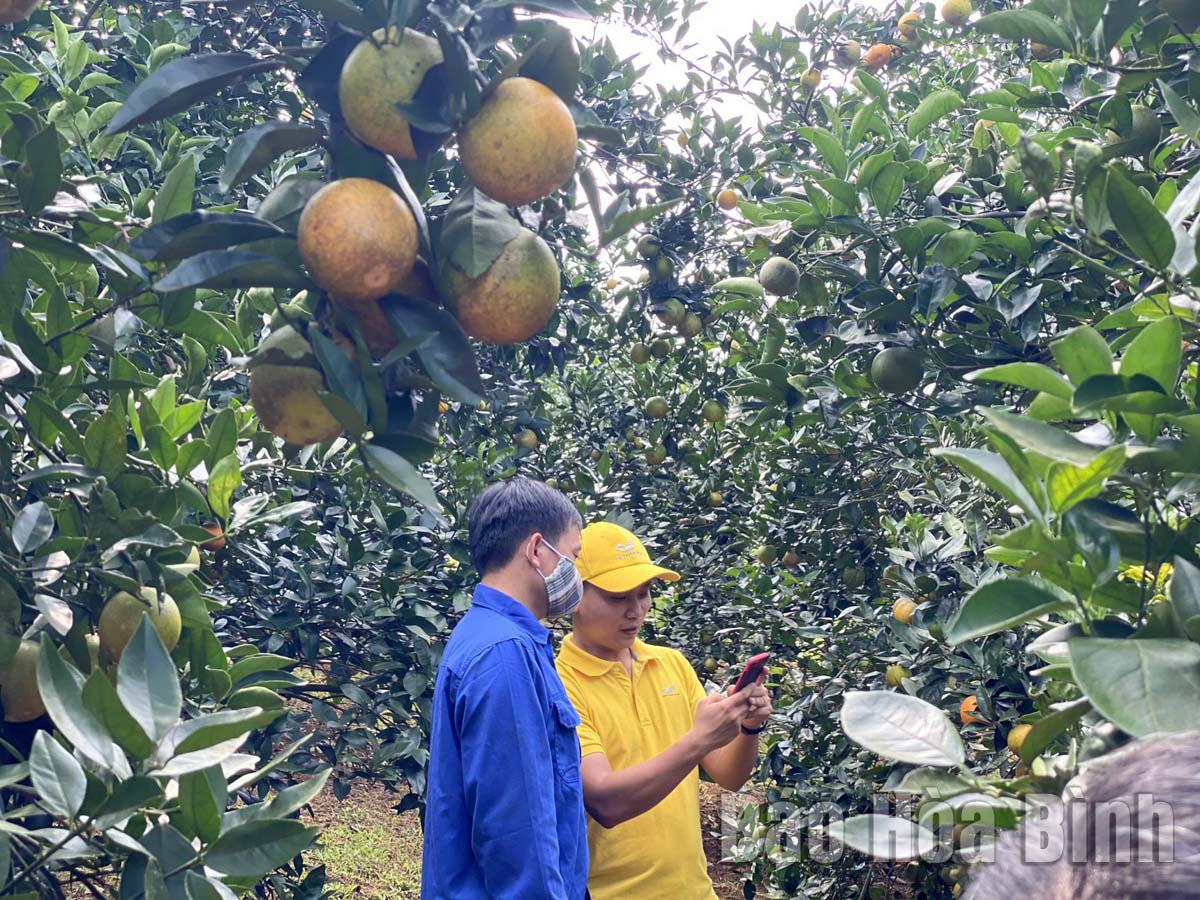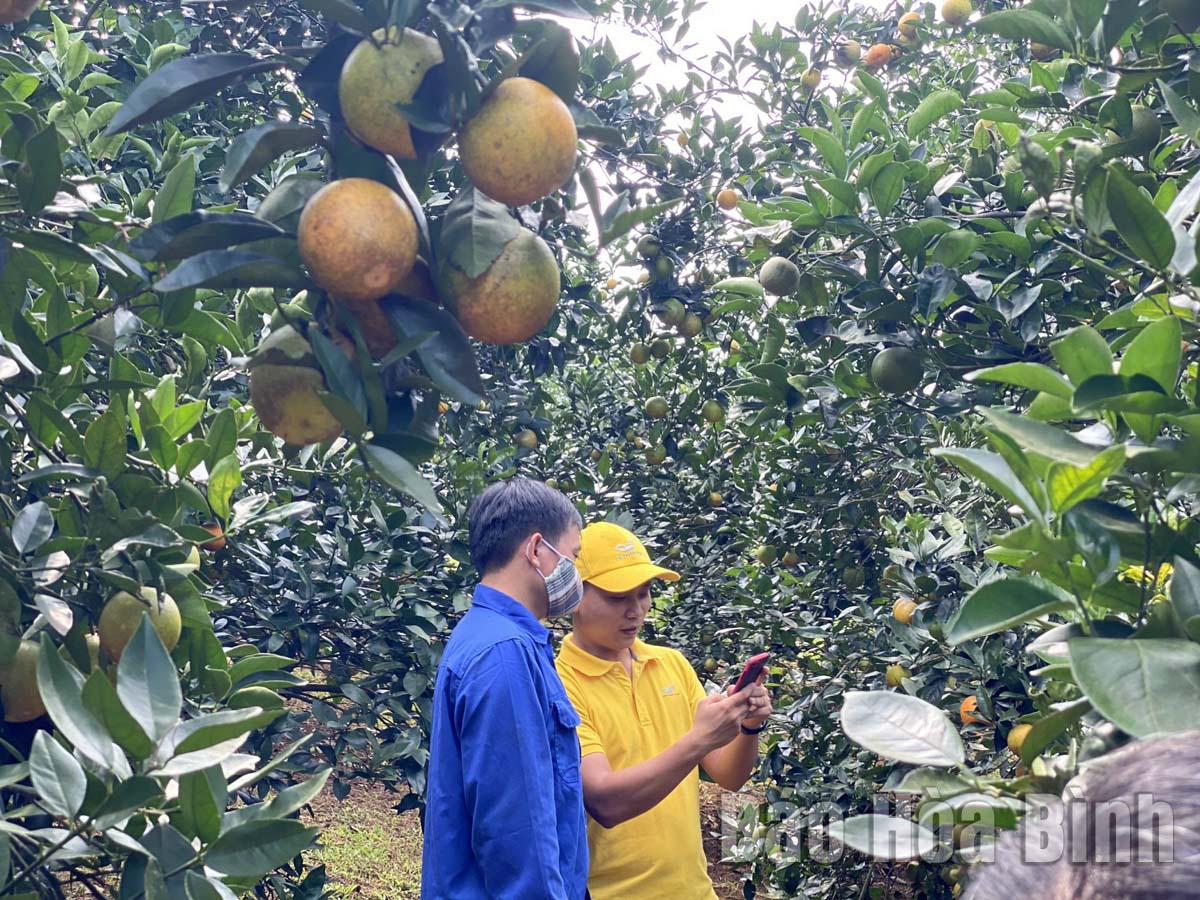
(HBO) – Though about 80 percent of Hoa Binh’s population are earning their living from agriculture, the sector makes up only 20 percent of its Gross Regional Domestic Products (GRDP). The mountainous province is pinning high hopes on digital transformation to shift the smallholding agriculture to an economy that goes towards sustainable development.
Photo: Hoa Binh’s provincial post cooperates with farmers to offer local specialty – Cao Phong orange – on e-commerce platforms.
Over recent years, Hoa Binh has paid more attention to developing clean and hi-tech farming models in three areas of horticulture, husbandry, and processing. The province has been actively deploying a number of digital systems managing agricultural and rural database.
A highlight among these is a natural disaster warning system providing hourly updates on rainfall information on vinarain.vn. They also include a disease monitoring statistics system, a system managing database on agricultural land at datnongnghiep.hoabinh.gov.vn, and a system for traceability of goods’ origin and buyer-seller linking in the province at hb.check.net.vn.
Additionally, information on agriculture has been provided to locals via four websites of the provincial Department of Agriculture and Rural Development. With these websites, farmers can look for information on farming techniques, prices of agricultural products, high farming technologies, and disease prevention, among others, to improve productivity and efficiency.
Nguyen Huu Tai, head of the division on management of agricultural, forestry and fishery quality, said his office is cooperating with several Vietnamese e-commerce sites, such as Postmart.vn (Vietnam Post), Voso.vn (Viettel Post), and Sendo.vn (FPT), to sell local farm products online. Thirty-one agribusinesses and cooperatives in Hoa Binh have joined Postmart.vn so far and 53 participated Voso.vn, Tai said.
The province is doubling efforts to implement its digital transformation programme in agriculture for the 2021 – 2025 period, with a vision towards 2030. The programme aims to build a digital ecosystem for the transformation from an agricultural production to an agricultural economy and the development of hi-tech agriculture, smart agriculture and accurate agriculture, and to increase the share of smart agriculture in the economy./.
According to data from the Hoa Binh Provincial Party Committee, the industrial production index for the first six months of 2025 is estimated to have increased by 20% compared to the same period last year. This marks the highest year-on-year growth rate for this period since 2020.
In the first six months of 2025, Hoa Binh province’s export turnover was estimated at 1.145 billion USD, marking an 18.11% increase compared to the same period in 2024. Import turnover was estimated at $ 804 million, a 17.15% increase, which helped the province maintain a positive trade balance.
The lives of the ethnic minority farmers in Tan Lac district have gradually improved thanks to the new directions in agricultural production. This is a testament to the collective strength fostered through the professional associations and groups implemented by various levels of the district’s Farmers’ Union.
With the motto the "product quality comes first,” after nearly one year of establishment and operation, Muong village’s Clean Food Agricultural and Commercial Cooperative, located in Cau Hamlet, Hung Son Commune (Kim Boi district), has launched reputable, high-quality agricultural products to the market that are well-received by consumers. The products such as Muong village’s pork sausage, salt-cured chicken, and salt-cured pork hocks have gradually carved out a place in the market and they are on the path to obtaining the OCOP certification.
In the past, the phrase "bumper harvest, rock-bottom prices" was a familiar refrain for Vietnamese farmers engaged in fragmented, small-scale agriculture. But today, a new spirit is emerging across rural areas of Hoa Binh province - one of collaboration, organisation, and collective economic models that provide a stable foundation for production.
Maintaining growing area codes and packing facility codes in accordance with regulations is a mandatory requirement for agricultural products to be eligible for export. Recently, the Department of Agriculture and Environment of Hoa Binh province has intensified technical supervision of designated farming areas and packing facilities to safeguard the "green passport" that enables its products to access international markets.



